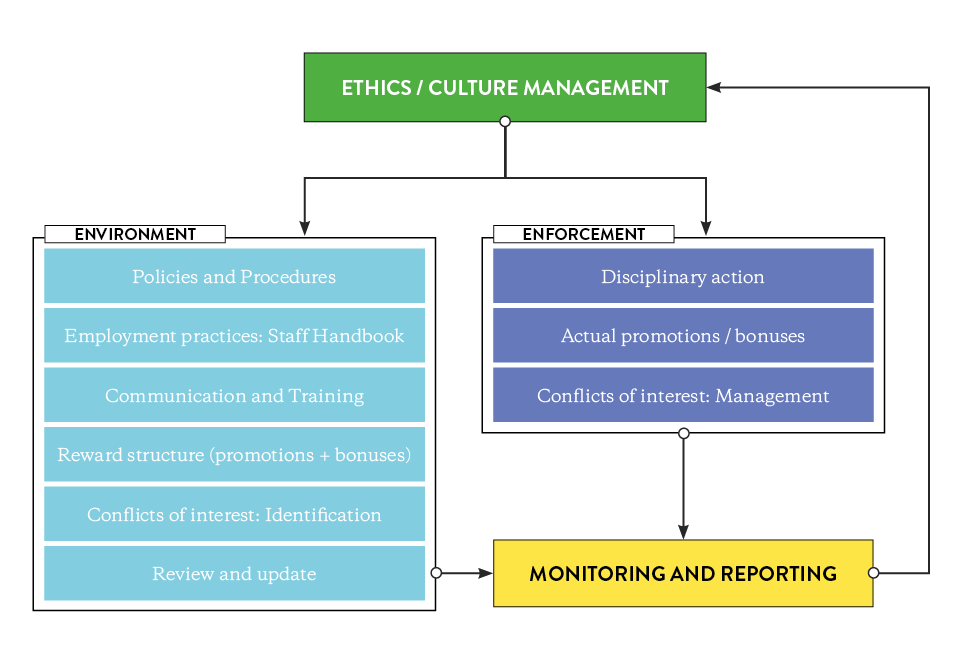Posted: 13th December 2019
Adrian Pay is a regular writer on the topics of anti-money laundering, governance and regulatory compliance.
With more than 24 years experience in financial regulation, he has worked across a number of sectors and geographies. He co-founded the FinTech LatentZero (Fidessa Buyside), and implements compliance systems with global investment managers.
Huntswood thanks him for sharing his expertise and opinion with us.
The world of global banking has been rocked in recent years by a series of money-laundering and compliance scandals.
And we don’t need to look very far below the surface to find the real reason that some of the world’s biggest firms have run into trouble.
They’ve all lost their CEO’s to the “silent boardroom killer” – poor ethics and bad compliance.
If senior managers and executives want to hold onto their jobs, they need to be the biggest promoters of an ethical and compliant culture within their business. After all, regulators are homing in on culture more and more lately. We only need to look at the Senior Managers and Certification Regime (SM&CR) to understand how much accountability is now placed on the Board’s shoulders.
When issues do arise in this new environment of heightened scrutiny, we need to ask more than simply “what went wrong”. Instead, we should be asking “why?”
Most of the time, the underlying cause will be poor ethical decision-making and a bad approach to compliance.
LIABILITY: COLLECTIVE AND PERSONAL
Even respected senior managers have allowed their banks to ‘go rogue’ for a range of reasons:
- Ignorance - They didn’t know what was going on (ignorance is better than knowing)
- Acquiescence - They knew there were issues, but didn’t want to upset their colleagues
- Financial - The rewards for bending or breaking rules were too tempting
- Miscalculation - They didn’t know the consequences of their actions, or inactions
- Normal Market Practice - They thought "everyone else is breaking the rules, why shouldn’t I?"
No matter the reason or justification for poor practice, senior management are being held responsible and liable for the actions of their firms.
Following the introduction of the SM&CR (and similar regimes around the world), senior managers should be left under no illusion that their responsibilities will catch up with them.
SOLUTION: AN ETHICAL CULTURE OF COMPLIANCE
Senior management used to impose control through detailed and highly prescriptive operating procedures enforced by inspectors. This ‘old school’ approach doesn’t work these days. Firms have to encourage their employees to operate on initiative. And this starts with culture.
As we all know, culture determines how people behave when no one is looking.
The only way senior management can control disparate businesses and operations is through a strong culture of compliance and ethics. Everyone from the Board down, has to be clear around the ethical, legal and regulatory parameters within which they must operate.
The consequences of not working within these bounds can be massive.
BIG PICTURE– THE ROADMAP
An ethical culture of compliance doesn’t just pop into existence overnight. It has to be planned, implemented, monitored and continuously improved. Through working with numerous regulated firms globally, I have developed a framework for ensuring companies achieve a strong compliance culture:

The first step to building a good culture is to nominate a responsible director who will sit at Board level. Next, firms have to appoint an experienced practitioner to define the desired culture, assess the current status and draft a plan to achieve the desired outcome.
As with all business objectives, the ethics / compliance plan needs to be implemented, monitored and improved iteratively.
NO PAIN, NO GAIN
There can be no sugar coating this: transforming your culture is going to hurt.
The most profitable parts of your business can be the ones with the biggest ethical or compliance risk.
Double charging clients, for example, is profitable but it is hardly ethical or compliant!
Implementing the right culture is going to have some impact on the bottom line, whether that be positive or negative. If it doesn’t, then it probably isn’t working.
It takes a strong commitment to implement an ethical and compliant culture. Firms have to apply a lot of thought, enthusiasm, intellect and energy to achieve the goal. Selectively using experts in this field can really help when it comes to defining and planning your firm’s approach to ethics and compliance.
Your firm’s business objectives and the objectives of all management and staff have to be aligned with your internal culture – and this (it bears repeating over and over again) needs to be one founded on ethics and compliance.
The rules apply to everyone equally and without exception. Even the most senior and powerful executives in the business have to play by the rules!
Culture – the solution to Boardroom mayhem
Bankers used to lose their jobs for poor results, not anymore.
Poor ethics and bad compliance are causing Boardroom mayhem. At a time when senior bankers should be focused on competing with FinTech startups, they are distracted by legacy compliance issues.
Focusing on building and maintaining a strong ethical culture and compliance framework is the only way for bankers to transform their firms and build banks fit for the future.








